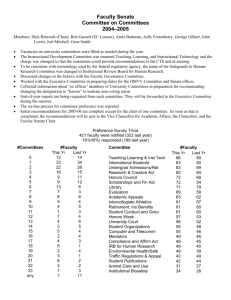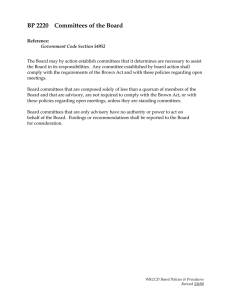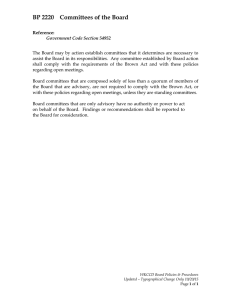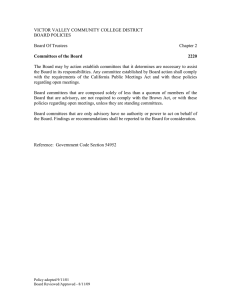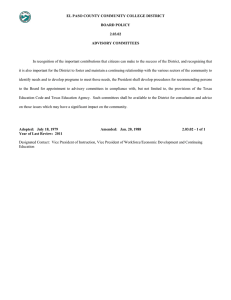POLICY
advertisement
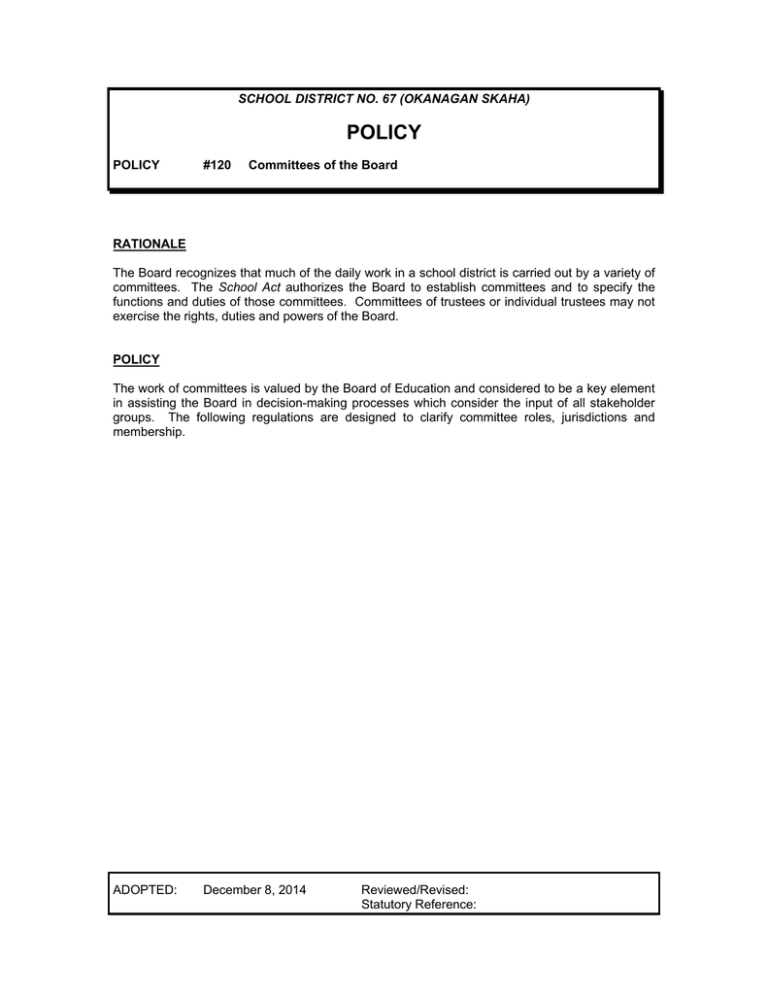
SCHOOL DISTRICT NO. 67 (OKANAGAN SKAHA) POLICY POLICY #120 Committees of the Board RATIONALE The Board recognizes that much of the daily work in a school district is carried out by a variety of committees. The School Act authorizes the Board to establish committees and to specify the functions and duties of those committees. Committees of trustees or individual trustees may not exercise the rights, duties and powers of the Board. POLICY The work of committees is valued by the Board of Education and considered to be a key element in assisting the Board in decision-making processes which consider the input of all stakeholder groups. The following regulations are designed to clarify committee roles, jurisdictions and membership. ADOPTED: December 8, 2014 Reviewed/Revised: Statutory Reference: REGULATIONS AND PROCEDURES POLICY 1. #120 Models of Committees: How They Operate 1.1 2. Committees of the Board All district committees are either advisory or consultative, following these definitions: a) Advisory Model (offering advice or making recommendations) Although not a decision making group, there is an expectation that significant weight is placed on the advice provided to the Board by such a committee. b) Consultative Model (taking into consideration) A consultative committee or working group provides expertise, but is not a decision making body. The Board might also seek other sources of expertise before making a decision. Types of Committees: How They Are Formed 2.1 All Board of Education committees are standing, liaison and representative or working committees of the Board, following these descriptions: a) Standing Is a permanent committee of the Board, meeting on a regular or irregular basis that reviews, advises or recommends to the Board as a whole. Membership may include stakeholder representatives, along with trustees. b) Liaison and Representative Is a committee that provides liaison with the Board and deals with advancing information and processes, which may facilitate different organizations working more effectively together. It may be formed internally (by the Board) or externally (outside organization). Trustees will be representatives of the Board on this type of committee and will report to a standing committee or directly to the Board. c) Working Is a temporary committee, sometimes referred to as an ad hoc committee, established by the Board or a Standing Committee to accomplish a particular task or to oversee an ongoing area in need of control or oversight. Membership may include stakeholder representatives, along with trustees. 2.2 The Board Chair will appoint members to the standing, liaison and working committees as per the Board’s Procedural Bylaw. 2.3 The Board Chair will name the committee chair to the standing committees and the committee chair and contact will establish the agenda. Future agenda items may be identified in committee. Should the committee chair be unable to attend the meeting, the Board chair will chair the meeting in their place. 2.4 District working committees are formed at any time at the request of the Board or one of the standing committees. The standing committee chair, in consultation with the Board chair, is to complete a form as the committee is created and file it Policy #120 Regulations and Procedures – Page 2 with the executive assistant at the district office. When the committee is brought to closure, it is the responsibility of the chair to inform the executive assistant. 2.5 The Board chair is a member ex-officio of all Board created committees. 2.6 No action of any committee of Board shall be binding on the Board until the action is formally approved by the Board of Education. 2.7 Board Standing Committee The School Act and Procedural Bylaw #1 provide for the organization and operation of the Board, and allows for the formation of Board committees. Standing committees are open to the public; however, if, in the opinion of the Board in accordance with its Procedural Bylaw, the public interest so requires, persons other than trustees may be excluded from a meeting. a. Education Committee Model: Advisory Type: Standing Committee of the Board Mandate: To meet with the superintendent of school and other appropriate staff to review, advise or recommend to the Board policies and actions pertaining to: i. ii. iii. iv. v. vi. Achievement accountability Educational goals and programs Student services Schools Environmental education and impacts Other matters referred by the Board Contact: Superintendent of Schools Membership: Committee of the Whole (all trustees) Standing Invitation to Representatives of the following Stakeholder Groups: Principal (OSPVPA) Teacher (OSTU Support Staff (CUPE) District Parent Advisory Council (DPAC) Agendas: Agendas will be set one week in advance by the Superintendent and Committee Chair by email, telephone or in-person. Agenda packages will be issued on the Friday prior to the committee meeting date. b. Business Committee Model: Advisory Type: Standing Committee of the Board Mandate: To meet with the superintendent of schools, the secretarytreasurer and other appropriate staff to review, advise or recommend to the Board policies and actions pertaining to: i. ii. iii. iv. v. vi. Financial accountability Long range facilities and capital planning Board Bylaws Business services Environmental education and impacts Other matters referred by the Board Contact: Secretary-Treasurer Membership: Committee of the Whole (all trustees) Standing Invitation to Representatives of the following Stakeholder Groups: Policy #120 Regulations and Procedures – Page 3 Agendas: Principal (OSPVPA) Teacher (OSTU Support Staff (CUPE) District Parent Advisory Council (DPAC) Agendas will be set one week in advance by the secretarytreasurer and committee chair by email, telephone or in-person. Agenda packages will be issued the Friday prior to the committee meeting date c. Agenda Setting Committee Model: Advisory Type: Standing Committee of the Board Mandate: To meet with the superintendent of schools and the secretarytreasurer to prepare the agenda for the open and closed, business and education meetings of the Board, in accordance with the Board’s Procedural Bylaw, with the following guidelines: i. ii. iii. iv. v. vi. Determine the appropriate agenda on which an item will be placed Defer items to a later agenda due to time constraints or preparation requirements Determine the amount of background material to accompany the agenda Refer an item to the Board for direction when the appropriateness is questioned Determine the delegations or special presentations to be included on an agenda in accordance with Procedural Bylaw #1 In cooperation with committee chairs, keep a record of future agenda items Contact: Superintendent of Schools/Secretary-Treasurer Membership: Board Chair Vice Chair 2.8 Liaison and Representative Committees a. Aboriginal Education Committee Model: Advisory Type: Liaison Mandate: To meet with and advise the Board of Education, superintendent and/or district staff in the Aboriginal Education Department to increase the success rate of Aboriginal students by increasing the capacity, participation and influence of the Aboriginal community and to review, advise and recommend to the Board policies and actions pertaining to: i. ii. iii. iv. v. Draft Enhancement Agreement Development and Implementation Reports regarding Aboriginal Education as required by the Ministry including review of the Aboriginal Education progress report Review targeted funding budgets for Aboriginal Education Seek input/research views and expectations of various stakeholders or sectors of the community Provide input with regard to procedures and protocols both cultural and organizational Policy # 120 Regulations and Procedures – Page 4 vi. Contact: District Reps Membership: Other matters referred by the Board or committee member(s) Director of Instruction (Curriculum) – non-voting Principal of Aboriginal Education – non-voting Voting members will include: i. ii. iii. iv. v. vi. vii. Three (3) members of the Penticton Indian Band nominated by the PIB chief and council, One (1) member of the Ooknakane Friendship Centre nominated by their board of directors, One (1) member of the South Okanagan Similkameen Metis Association nominated by the Metis Nation of British Columbia One (1) Trustee appointed by the Chair of the Board of Education One (1) member of the Okanagan-Skaha Teacher’s Union (OSTU) (non-voting if the member is an AbEd staff member) One (1) member of the Principal’s and Vice Principals Association One (1) Elder (non-voting) A committee chair will be elected by the voting membership of the committee on an annual basis. Full terms of reference have been developed separately by this committee and are available. b. Other Liaison And Representative Committees May require trustee representation, including but not limited to: i. ii. iii. iv. v. vi. vii. viii. ix. x. xi. xii. xiii. xiv. xv. xvi. xvii. xviii. xix. xx. xxi. xxii. xxiii. ADOPTED: B.C. School Trustees Association B.C. Public School Employers’ Association Okanagan Skaha Principals/Vice-Principals’ Association Liaison Okanagan Skaha Teachers Association Liaison CUPE Liaison District Parent Advisory Council Okanagan Labour Relations Council (usually the elected BCPSEA Rep) Curriculum Development Advisory Committee OSTU Pro-D Committee OSTU Pro-D Funding Committee BC Winter Games Child and Youth Committee – Summerland City of Penticton Liaison Communities for Kids – Penticton Community Foundation of the South Okanagan Okanagan School of the Arts Penticton Secondary School Bursary and Scholarship Foundation Penticton & Wine Country Chamber of Commerce Summerland Advisory Planning Committee Summerland and District Educational Funding Foundations Summerland Chamber of Economic Development & Tourism Summerland Recreation Committee Wellness Committee December 8, 2014 Reviewed/Revised: Statutory Reference: December 9, 2014 Ref: U:\SBO-ST-Data\SECTR JULY 2014\00100-00999 Administration\00540 Policies and Regulations\00540-02 Policy Manual Originals\Policy Manual\Policy 120 Committees of the Board.docx
